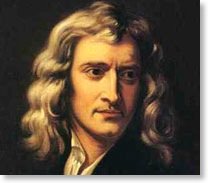Sir Isaac Newton (1642 - 1727)
This article has been copied from the Creation Safaris website and was authored by David Coppedge. It is posted here with permission. The original article can be found here.
That the greatest scientist of all time was a Christian and a creationist should give any Darwinian pause. Co-inventor of the calculus, discoverer of the law of universal gravitation and the three laws of motion, analyzer of white light split into colors by means of a prism, inventor of the reflecting telescope and author of the most important book of the scientific revolution (the Principia Mathematica), Sir Isaac Newton is unexcelled in the roll call of great scientists.
But did your history books forget to tell you that Newton wrote more on theology than on science? A recent article in Nature confirms this (see 08/19/2004 entry in Creation-Evolution Headlines): Newton approached the study of the Bible with as much rigor and planning as he did physics. Even more important, “Newton’s religion and science may have been tied together by belief in absolute truth.” To him, the Bible revealed the truth about God just as much as scientific inquiry uncovered truth about nature.
Newton was an unlikely scientist, coming from a poor family, cared for by two women who did not care much for the job. He was a loner and eccentric, and proved later in life to be personally vindictive against those he disliked (particularly Robert Hooke, whose memory he tried to virtually erase). Some have questioned the orthodoxy of his theological views about God and Jesus Christ, while others have defended them. Newton seems to have wasted much time exploring alchemy and some obscure theological and eschatological views. For these reasons we cannot appraise Newton as a “gold medalist” in this series (judging on orthodoxy, personal integrity and advancement of creation thought in addition to scientific achievement), but he certainly demonstrates the fundamental themes that creation-based science is the best, and the best scientists believed in God, honored the Bible and were motivated by their theological views.
It should be recognized that Newton was not a “Newtonian” in the sense of being a Deist. Subsequent disciples of Newton’s laws interpreted them to mean the universe ran like a clock, subject to mechanical regularities that could not be altered. This made it seem the Creator wound up the clock at the creation and then left it to run on its own. In the extreme, this view would deny any active involvement by God in His creation. But God cannot be put in a Newtonian box, and Newton himself, certainly, did not think of God in this way in the least. A recent biography by James Glieck, reviewed in Science (see 08/15/2003 entry), makes this clear. Newton considered the Lord Jesus Christ the Savior of the world, and trusted and believed in the Biblical miracles. He wrote strong papers refuting atheism and defending creation and the Bible, said Henry Morris (Men of Science, Men of God). Let Newton tell us himself what he thought: “I have a fundamental belief in the Bible as the Word of God, written by men who were inspired. I study the Bible daily.”
To be able to claim credit for discovering the basic laws of nature – gravitation, optics, the laws of motion – would that not provide a resume to boast about? Here’s what this supreme scientist had to say about that: “All my discoveries have been made in an answer to prayer.”